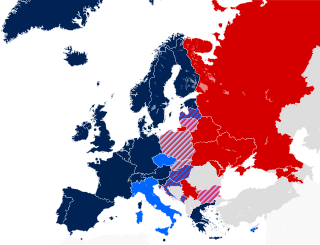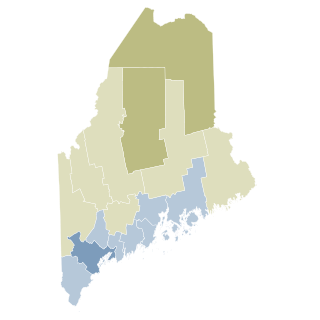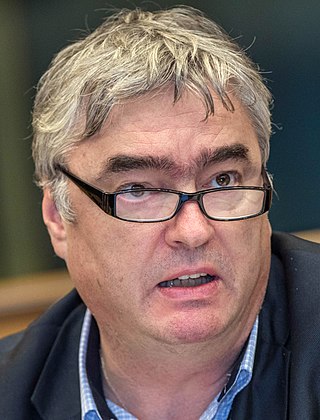
Croatia recognizes life partnerships for same-sex couples through the Life Partnership Act, making same-sex couples equal to married couples in almost all of its aspects. The Act also recognizes and defines unregistered same-sex relationships as informal life partners, thus making them equal to registered life partnerships after they have been cohabiting for a minimum of 3 years. Croatia first recognized same-sex couples in 2003 through a law on unregistered same-sex unions, which was later replaced by the Life Partnership Act. The Croatian Parliament passed the new law on 15 July 2014, taking effect in two stages. Following a 2013 referendum, the Constitution of Croatia has limited marriage to opposite-sex couples.
The Czech Republic has offered registered partnerships for same-sex couples since 1 July 2006. Registered partnerships grant several of the rights of marriage, including inheritance, the right to declare a same-sex partner as next of kin, hospital visitation rights, jail and prison visitation rights, spousal privilege, and alimony rights, but do not allow joint adoption, widow's pension, or joint property rights. The registered partnership law was passed in March 2006 and went into effect on 1 July 2006. The country also grants unregistered cohabitation status to "persons living in a common household" that gives couples inheritance and succession rights in housing.
Same-sex marriage has been legal in Slovenia since 9 July 2022 in accordance with a ruling from the Constitutional Court of Slovenia. The court ruled that the ban on same-sex marriages violated the Constitution of Slovenia and gave the Slovenian Parliament six months to amend the law to align with the ruling, although the decision took effect immediately after publication. The National Assembly passed legislation on 4 October 2022, which was overridden by the National Council one week later, but reconfirmed with a final vote in the National Assembly on 18 October 2022.

Lesbian, gay, bisexual, and transgender (LGBT) people in Slovakia face legal challenges not experienced by non-LGBT residents. Both male and female same-sex sexual activity are legal in Slovakia, but households headed by same-sex couples are not eligible for the same legal protections available to opposite-sex couples. While Slovakia grants same-sex couples limited legal rights, namely in the area of inheritance, the country does not recognize same-sex marriage or civil unions as of 2023. Slovakia, unlike its neighbour, the Czech Republic, holds more conservative views on issues dealing with LGBT rights.

Lesbian, gay, bisexual, and transgender (LGBT) rights in Slovenia have significantly evolved over time. Slovenia was the first post-communist and remains the only Slavic country to have legalised same-sex marriage.

Lesbian, gay, bisexual, and transgender (LGBT) rights are widely diverse in Europe per country. Twenty of the 35 countries that have legalised same-sex marriage worldwide are situated in Europe. A further eleven European countries have legalised civil unions or other forms of more limited recognition for same-sex couples.
Same-sex marriage has been legally recognized in Rhode Island since August 1, 2013. The state had authorized a limited form of domestic partnerships from 2002 to 2011 and the formation of civil unions from 2011 until the state began recognizing same-sex marriages in 2013. Rhode Island was the last state in New England to legalize same-sex marriage.
Slovakia does not recognise same-sex marriage or civil unions. In addition, the Constitution limits marriage to opposite-sex couples. Bills to recognise same-sex partnerships were introduced several times, in 1997, in 2000, in 2012, in 2018, in 2021 and in 2022 but were all rejected.
Montenegro has recognised same-sex unions since 15 July 2021. In July 2020, the Parliament of Montenegro passed a bill, by 42 votes to 5, to recognise life partnerships for same-sex couples offering several, but not all, of the rights and benefits of marriage. The bill was signed into law on 3 July 2020 by President Milo Đukanović, and took effect on 15 July 2021.

The 2009 Washington Referendum 71 (R-71) legalized domestic partnership in Washington state, the first statewide referendum in the United States that extended to LGBT people the rights and responsibility of domestic partnership. The bill had passed State Legislature, and it was signed into law by the Governor in May 2009, but opponents gathered enough signatures to put the measure before the voters, who returned ballots by mail over three weeks ending on November 3, 2009, approving the measure 53% to 47%. The new law went into effect 30 days later, on December 3, 2009.
A referendum was held in Slovenia on 25 March 2012 on the new family code passed by the then-governing coalition led by Borut Pahor. The code was rejected with 54.55% of voters against the law.

Maine Question 1 was a voter referendum on an initiated state statute that occurred on November 6, 2012. The referendum was held to determine whether or not to legalize same-sex marriage. The referendum passed with a 53-47% vote legalizing same-sex marriage in Maine.

Referendum 74 was a Washington state referendum to approve or reject the February 2012 bill that would legalize same-sex marriage in the state. On June 12, 2012, state officials announced that enough signatures in favor of the referendum had been submitted and scheduled the referendum to appear on the ballot in the November 6 general election. The law was upheld by voters in the November 6, 2012 election by a final margin of 7.4% and the result was certified on December 5.

Question 6 is a referendum that appeared on the general election ballot for the U.S. state of Maryland to allow voters to approve or reject the Civil Marriage Protection Act—a bill legalizing same-sex marriage passed by the General Assembly in 2012. The referendum was approved by 52.4% of voters on November 6, 2012 and thereafter went into effect on January 1, 2013.

The Voice for Children and Families is a right-wing Slovenian political party. The party was founded on 25 March 2017 by Aleš Primc and Metka Zevnik as an electoral arm of a movement of which they are also leaders of, the Movement for Children and Families, the initial purpose of which was to overturn a law passed by the National Assembly which would recognize same sex marriage in the Republic of Slovenia.
Same-sex marriage is currently not recognised nor performed in Bermuda, a British Overseas Territory, but it was legal between 2017 and 2022. However, marriages performed during that period remain valid.
A referendum on a law governing the Divača-Koper rail upgrade was held in Slovenia on 24 September 2017. The referendum was marked by a low turnout; a majority of voters voted in favour of the proposed law. The results were annulled by the Supreme Court in March 2018, resulting in a new referendum being held in 13 May 2018.

2019 European Parliament elections were held in Slovenia on 26 May 2019. This was the most recent in the series of four elections held over the period of two years.
Slovenian Disability Rights Association is a disability rights organization in Slovenia. Its goals are to enhance the implementation of the Convention on the Rights of Persons with Disabilities and to assist persons with disabilities through awareness raising and impact litigation. Drupis was founded in 2012.
The recognition of same-sex unions varies by country.











